Laura Zerra is focused. The 35-year-old reality television star and social media influencer sits in an ice shack on a frozen river in South Dakota, her gloved hand tapping an 8-foot steel spear. A rectangle the size of a 60-inch flat-screen has been cut through the 13-inch-thick ice. We jig grubs without hooks and rattle traps in hopes of attracting a walleye or pike, and then, the spears will fly — or so we’ve been told.
Laura Zerra is a survivalist — a doer of outdoor things. Our “dark house” shanty has no windows or light except the glowing red sunflower of the propane tank heater. In the dark, on metal chairs, elbows on knees leaning over our ice hole, we’ve talked about shed hunting, deer butchering, brain tanning. When our conversation moves toward how to poop off a moving freight train — a skill she learned when train-hopping through Mexico’s Copper Canyon — a walleye drifts into sight.
“Oh, fish, fish,” she says, mid-pants drop in the Sierra Madre, but here and now a fish. “Right there!”
“Spear,” I say as she unhooks the nine-tined beast that hangs next to us, a cross between Poseidon’s trident and a metal garden rake. “Lower it,” I say. “Lower, lower, lower.” I’ve done this exactly once, the day before, so basically, I’m an expert. “Faster. Yup. Faster, faster.” She moves the spear down over the hovering walleye’s head. “Right over it. Yup. Yup. Send it.” With her hand on the spear’s pommel, she does a gentle push-shove-thrust, then lets go, like she’s done this 1,000 times before. There’s a dust-up on the river bottom, then silence.
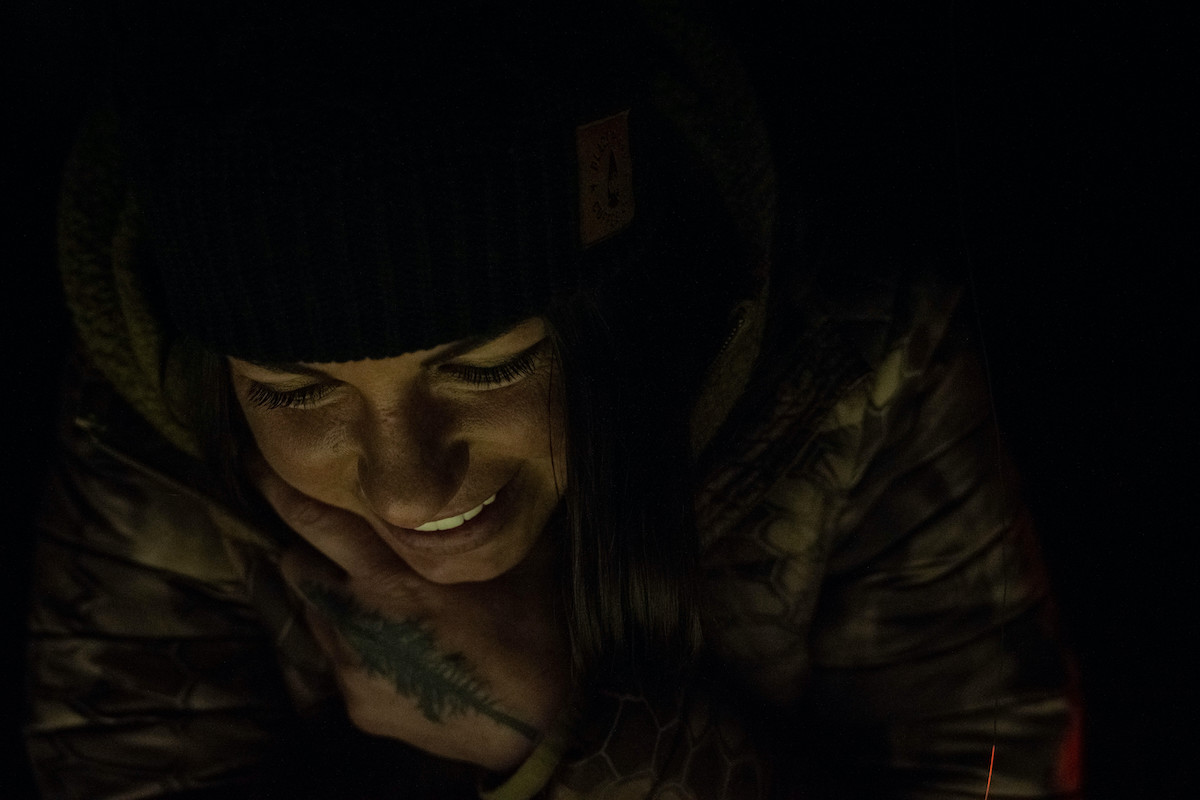
“Did I get it?”
The water clears, and a neck-shot fish writhes on the tines. “I got it!”
Laura Zerra takes up the paracord line and the spear, then walks backward out of the dark house, spear on shoulder, fish on spear. “This is so surreal,” she says, backing out the door. “It went from nothing to this.”
There’s a brief celebration in the minus 9-degree air. The sun is rising, tinting the bluffs along with the Missouri River orange. Laura Zerra has speared fish while free diving in Hawaii and standing stock-still for hours in a Panamanian lagoon — before a cameraman on Naked and Afraid splashed in for the kill shot and boogered off her dinner. We snap a few photos as the walleye turns white in the subzero wind — freezing solid right before our eyes.
“So,” she says, spear still on shoulder. “You hang off the side of the train. You hang off the ladder, on the side of the boxcar, and just go.”
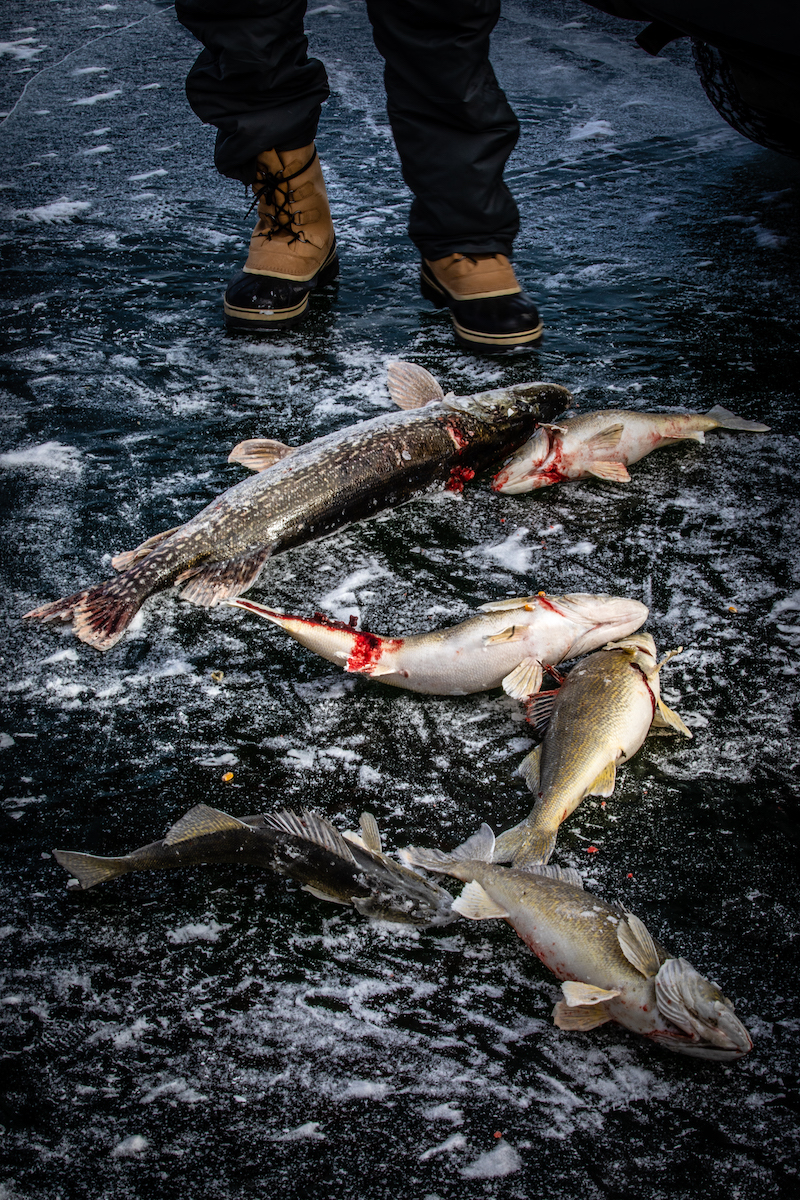
There are many varieties of social media influencers. In the hunting, fishing, and outdoor space, most Insta-fame is earned. Yet as corporate ad budgets have moved to the ’gram, “likes” can translate to dollars. In this landscape, some female influencer types have realized bikini+fish is a surer way to those likes than in the more competitive IG genres, like straight bikini or lingerie or fitness accounts. This and some minor scandals have led many in the outdoor space to use the adjective influencer as a pejorative, such as: “The guide did all the work. She’s an influencer.”
There are plenty of legit badasses — accomplished outdoor women making a living on social media — but they can feel harder and harder to find as the algorithm, it seems, boosts looks. So, when I told a friend about the lineup of influencers on this ice fishing trip, he asked pointedly, “Think one of them will bring a fur bikini?”
Laura Zerra did not bring a fur bikini.
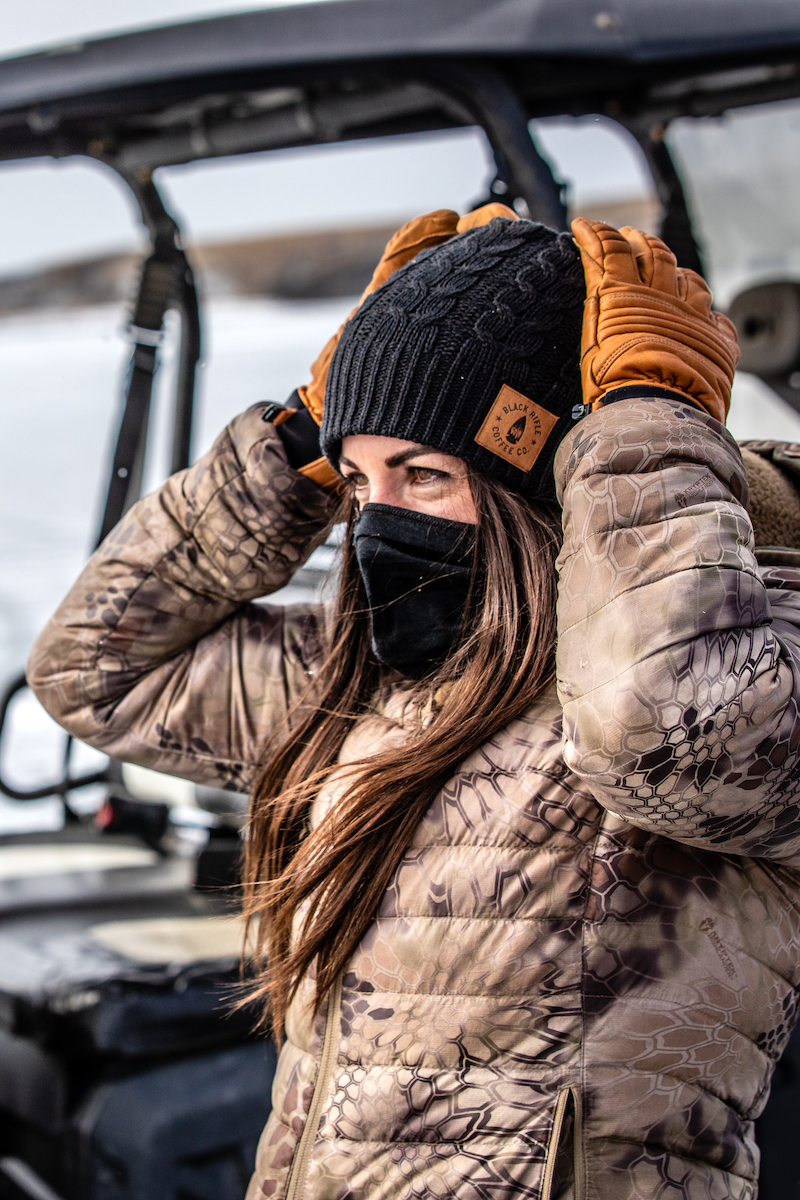
Laura Zerra is not “Laura” or “Zerra.” She is only “Laura Zerra.” In South Dakota, it was never, “Where’s Laura?” or “Get Zerra.” Only “Laura Zerra.”
Laura Zerra was working as a farrier in New Hampshire when producers called looking for contestants ahead of the first season of Naked and Afraid in 2013. She appeared on five episodes over five seasons. Naked and Afraid puts two strangers — one man, one woman — in an austere environment like a deserted island, a tropical rainforest, or the Alaskan wilderness. They’re tasked to survive 21 days (or 40 in the XL Edition) with no food, water, or clothing provided. They can bring one survival item. Most contestants do not make it, though the women generally outperform the men.
“To me, it sounded like a free vacation,” she said. The producers conveniently left out the naked part until contracts were drawn up. “I knew right away, going into that first show and all the others, I knew I’d make it to the end,” she says. “I had enough calories on me walking in to make it to the end.”
Before all her wilderness adventures — televised or otherwise — Laura Zerra bulks up on a diet of mostly butter, salami, granola, and cheese. The extra weight is a way to store calories that the producers cannot take away or that cannot be lost if a pack rolls off the mountain. Whatever the trip, she plans to lose 1 pound a day and gets to eating well ahead of time. Laura Zerra is incredibly active. She runs ultramarathons.
Most of Laura Zerra’s best reality television stories are bound up in nondisclosure agreements. A friend of mine who won a different survival show on another network told me that if you watch these shows and think, “This is all bullshit,” you’re not entirely off. He said the surviving is real AF, mind you, but producers stack the deck to make the “competition” feel like an honest horse race. Often it is not. A good survivalist, a real survivalist, might be handicapped from day one. They can’t take their favorite knife or fishing rod. They stick them with a dinky piece of flint. If another contestant is in over their head and breaks down before there’s enough filmed material in the can, producers might get them a therapist and a meal. Laura Zerra is good at surviving, and when I run this all by her, she says [nondisclosure agreement] and [nondisclosure agreement] and [nondisclosure agreement]. “I knew whatever happened, I could win.”
Laura Zerra survived, and often thrived, before a national audience of tens of millions of regular viewers — in Panama and Peru for 21 days. She survived a 14-day challenge in Alaska with fellow Naked and Afraid all-star Steven Lee Hall Jr. She survived a 40-day event in Colombia and a 60-day challenge on the Philippine Island of Palawan.
“I don’t ever really tell people I was on Naked and Afraid,” she says, sitting back over our hole in the South Dakota ice. She’s grateful, though, for the fans it’s put in her life. She has regular correspondence with a woman in Texas who suffered a stroke. The woman drew on Laura Zerra for inspiration. Laura Zerra loves back these people who’ve watched and love her. Yet, she doesn’t talk about TV much because “I don’t have anything to prove. I’ve been doing this stuff for 20 years now. Most of my craziest adventures, I didn’t have a camera with me and —”
“Fish!”
“Josh, you’re up,” she says to our friend who’s sitting with us in the dark house.
Josh grabs the spear, but we’ve lost it. The fish slides off into the abyss. Laura Zerra spots it again. “Far corner, right there. There —”
“Yes,” he says. “Yes, yes —” and the spear sails through the water and another walleye is on the tines.
“This is so weird!” she howls with a laugh. “I love it!”
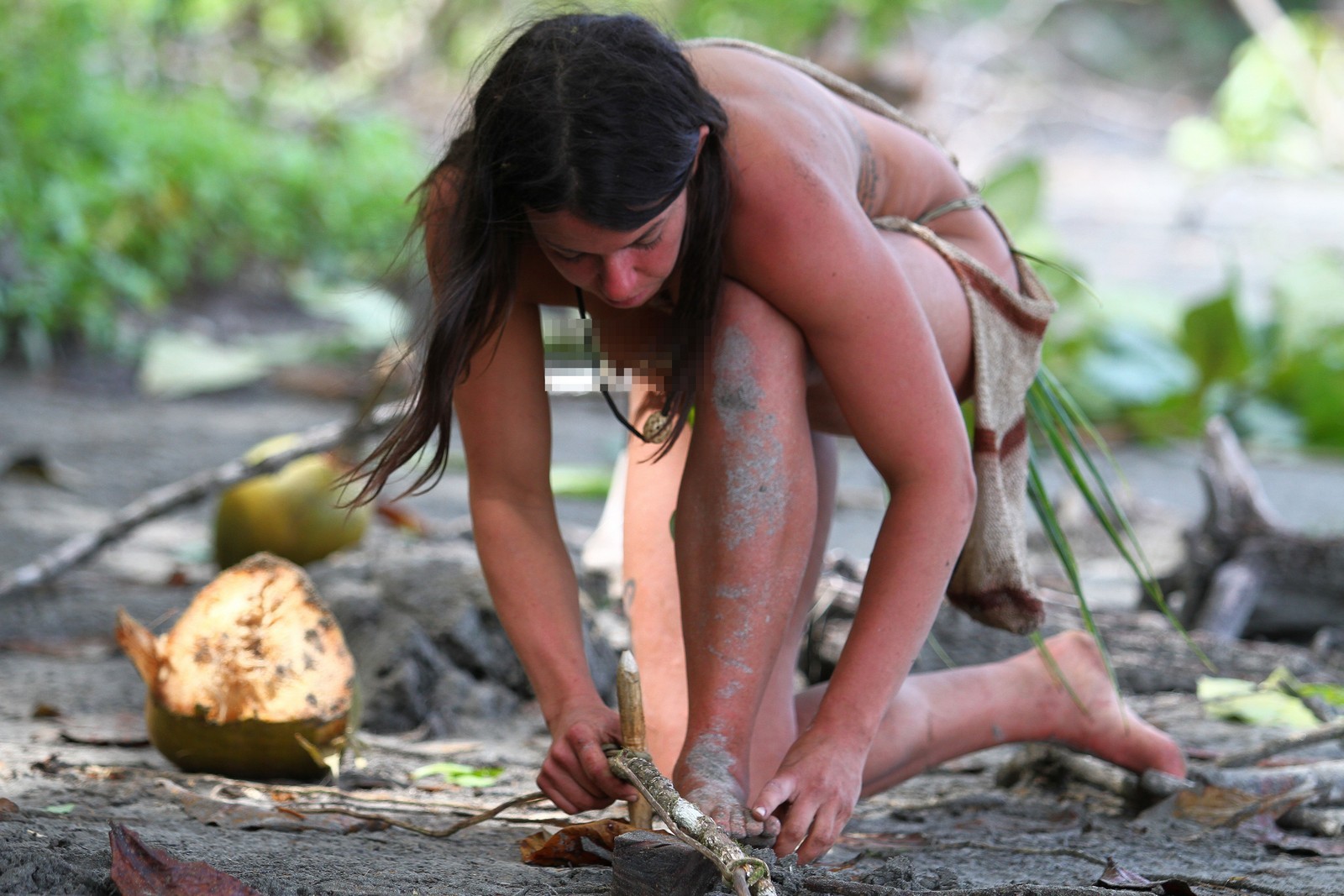
The dark house tells no lies. When you’re sitting in a metal chair 4 inches from someone, the conversation floats down deep, deep, deep, like these river-run walleyes and pike. The sunflower of the propane heater hisses white noise. The ice cracks and pops below us. The dark house heats up quickly, and it’s not uncommon to strip down to T-shirts, even though it’s well below zero just a three-quarter-inch sheet of plywood away. The dark house is like a sweat lodge or a Catholic confessional — a drawn-out primal therapy. All things come out. It’s not uncommon for our host, Paul Steffen, to pick up clients and find them blindly drunk, barely able to stand, or stone sober and sitting on the ice outside the shack head in hands. He knows of at least two children conceived on the ice. One guy brought a stripper. She sank a leg in the ice hole. Presumably, the dance did not continue.
“My dad was asked to describe us once,” Laura Zerra says. “He drew a bell curve on a piece of paper and put my sister Jen, the corporate lawyer, on one end, and my sister Patty, the pediatric hematologist, on top, then me on the other end. I think that’s so, so accurate.” All the sisters successful but in wildly different ways.
Laura Zerra was raised outside Springfield, Massachusetts — her dad, Steve, an electrical engineer, and mom, Liz, a preschool teacher.
“I was a really miserable kid,” Laura Zerra says. “Like, I was the saddest child ever. And it wasn’t that I had a terrible childhood; my parents were great. I cried every day at school. I told everyone it was allergies. I was just such a sad kid. I wasn’t like, living, you know. As soon as I started touching the outdoors, touching life, everything changed. I’m probably the happiest adult you’ll ever meet. I love my life.
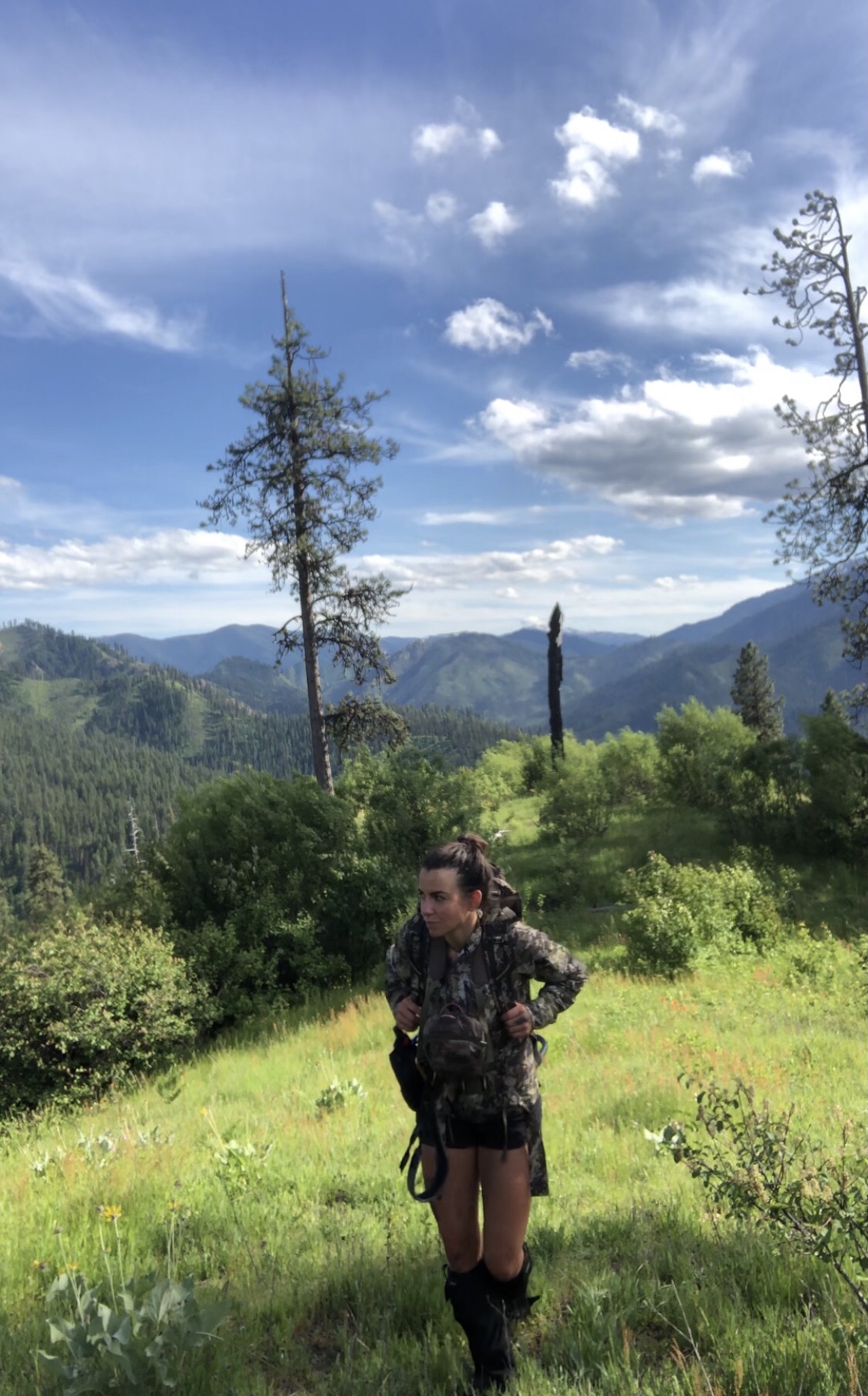
“I have an exciting life, and even the bad shit just creates contrast. The darkness makes the light brighter. I think that our ancestors had that every day, and they didn’t have to create it because that was just life. But now we have to go out and seek life, seek adventure, seek discomfort. The fact that most people don’t — they seek comfort — is why a lot of people just aren’t happy, I think. They don’t know what they’re missing.”
In the fifth or sixth grade, Laura Zerra found a coyote den and sat by it for hours. The coyote mum came to tolerate her. After school, she’d sit with them and handle the pups like part of the pack. She decided to be a vegan. It seemed a way to honor the natural world.
One Easter Sunday, driving home from church, 14-year-old Laura Zerra spotted a dead beaver in the road. It was the second beaver killed in that spot, and it made her furious. She went home, changed out of her dress, and convinced her sister to drive her back. She put a pickax, a dull knife, and a pickle jar in the back of her sister’s old green Camaro. As she moved the beaver to the woods, 7 feet of entrails dragged across the asphalt. She had heard of brain tanning, so she cut away the hide and opened up the skull.
“I thought it would be disgusting,” she says, “but the meat package made sense. I saw how it all worked. I got the hide off and brain-tanned it.”
She wanted to honor this critter, to “make sense of a senseless death,” she says. “No one gave a shit, and this thing was going to rot. I turned it into this beautiful thing, I made a beautiful thing I used for years.” She turned it into a pillow.
“I thought it would be disgusting, but the meat package made sense. I saw how it all worked. I got the hide off and brain-tanned it. … I turned it into this beautiful thing.”
At 17, she enrolled in Connecticut College. The dominant social activity at Connecticut College is the a cappella singing clubs. Think Andy from The Office clouded in weed smoke with a deep concern for potable water in Africa — that is Connecticut College. One morning she found a dead turkey that had been hit on the main road in front of the school. She grabbed it and brought it to her anthropology professor, Manuel Lizarralde, whose father had made first contact with a tribe of indigenous people in Venezuela. They butchered and ate the turkey. “I was like, this is it,” she remembers. “I’m on the path.”
Lizarralde showed her how to make a bow and shoot traditional archery. Whitetails overran the college campus, and he had permission to hunt them with discretion. Laura Zerra went with, and one evening, he hit a doe with his primitive archery tackle. The deer hung up in a fence by the botanical gardens, dying poorly. Laura Zerra moved in with a knife and slit the deer’s throat. As the great sense of sadness, and loss, and exhilaration, and excitement that all hunters know moved through her, she spotted the girls’ lacrosse team on the other side of the fence, out for an evening run. “I realized right away I was having a very unique college experience.”
In 2006, Laura Zerra dropped out of college. She says it was “the proudest decision” of her life because it symbolized a break from “the way things are supposed to be.”
She launched into a decade of adventuring. In West Yellowstone, Montana, she interned for the Buffalo Field Campaign, documenting the last wild herd of bison in the park. She taught survival skills at the Roots School in Vermont, focusing on brain tanning and meat processing. During the winter of 2008, Laura Zerra bought a one-way ticket to Mexico. She hitchhiked and hopped freight trains south to Oaxaca, then up the west coast, studying jungle survival. She didn’t carry a camera but has one photo taken on borrowed gear of the Copper Canyon — a place her father had always wanted to see. When Steve Zerra got the picture, he was aghast that she was clearly riding on top of the train, not in it.
Laura Zerra worked odd jobs as a mushroom hunter in Oregon, a tree planter for the Forest Service in Idaho, and a leader of horse treks at an Icelandic horse farm in Vermont. She spent a year as an apprentice farrier and blacksmith in New Hampshire and would later write a book about knife making. She worked on a crab boat out of New Bedford, Massachusetts. She had moved to Colorado to apprentice as a taxidermist, then back to New Hampshire, when the Naked and Afraid team called looking for talent.
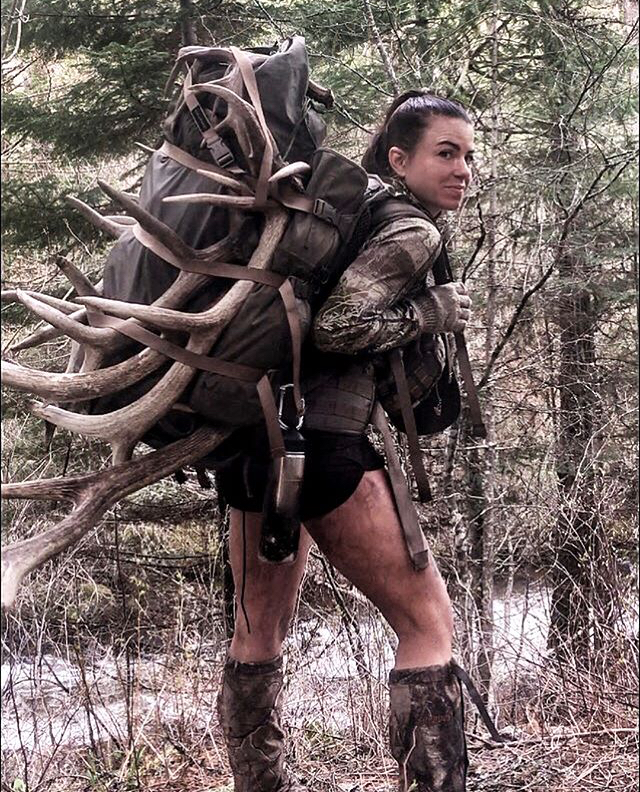
“Whenever I wanted to learn something, I got a job,” she says. “I knew I’d never be as good as the master taxidermist I worked with, who was an artist, who developed over a lifetime, but I wanted to know how he does it. I want to learn to weld and fix cars, but I don’t think I can spend the time needed indoors for that. All my interests require the outside.”
At one point, she realized she was comfortable in the wild but not so much in cities. So, she spent a month living with homeless people in Chicago. She learned how to blend in, move, feed herself when no edible plants are around. “In a way,” she says, “they showed me how to be invisible.”
Over those 10-plus years of travel, odd jobs, and skills development, her primary mode of transportation was hitchhiking. Laura Zerra is 5-foot-4. She is not imposing. She looks like the girl next door. I had to ask, “Did you ever feel unsafe, getting in so many strangers’ cars?”
“So, when someone would pull over, I would always ask them where they were going, and that would give me a 15- to 30-second window where I could get a feel for the person. And then I went with my gut. I really learned to trust my gut. The only times I ever went against my gut were the times when I was like, ‘Oh, shit. This is really bad.’”
In Alpine, Texas, after riding a freight train in the wrong direction, she got in the car with a guy who seemed off. He pulled a gun and held it to her head. “He didn’t say anything. I was like, ‘You can take whatever I have. I don’t have much, but it’s all yours.’ He was silent, for what felt like forever. Then he put the gun under the seat and just said, ‘Welcome to Texas. Just so you know, we all have guns.’”
In hindsight, she doesn’t know if he was a mental health case or wanted to teach her some kind of sick lesson or probably both. Soon as the car stopped, she got out. “That one was just a freebie.”
Another time, she had spent a night out in subzero temps roadside in Montana. The next day, in the freezing cold, a trucker stopped and she got in. “He was Eastern European or Russian; I couldn’t tell. He had a weird vibe and was on the CB most of the time with another trucker speaking the same language. The only thing he asked me was, ‘Are you married?’ And I immediately was like, ‘Oh, I’m actually going to see my boyfriend,’ and I went into this story about how I was hoping we were going to get engaged soon, I hadn’t seen him in a long time. I wanted him to know I’d be missed.
“I want to learn to weld and fix cars, but I don’t think I can spend the time needed indoors for that. All my interests require the outside.”
“So, I told him, ‘This is my exit, sir,’ and he pulls off but keeps going. Then he pulls way down this back road. He’s talking in this language to another guy on the CB, and then I see headlights of another truck that’s following behind us. We’re in the middle of nowhere. No lights. No houses. No anything. But I can see we’re high on the edge of this cut riverbank. He stops, and I just open my door, grab my bag, and run.
I dove off the riverbank, down the cutbank. I stashed my bag then just crawled, ran, scrambled as far as I could down the river. There was this big root system on the edge of the bank, and I just crawled in that root ball and hid. Eventually, after a while, I was pretty sure I heard the trucks leave, and I just stayed there till morning. It was pretty scary.”
At daylight, she walked down the highway — certain the trucks would show up again. “I felt hunted. Logically, I knew that they probably just kept going, but I wanted to be around people. I felt like they were lurking, waiting for me.”
“Did that cure you of hitchhiking?” I asked.
“No,” she laughs. “I kept at it another five years. I just told myself, ‘Don’t go against your gut.’”
Laura Zerra’s parents hear most Laura Zerra stories listening to podcasts and following their daughter online. “We made a rule,” her mom, Liz, told me. “Tell us about your adventures after they’re over.” Her dad, Steve, likes to tell the story of picking her up at the Amtrak station in Springfield after her internship in Yellowstone.
“Everyone got off, and she wasn’t in with the passengers,” he remembers. “I thought something was odd; then I noticed police lights on the other side of the train. After 25 minutes, what looked like a mountain man walked toward me next to a very well-dressed guy carrying a couple bags. The mountain man was Laura in a pair of coveralls, and the stationmaster was with her, helping carry her bags.”
She had a frozen buffalo skull and scraps of hide scavenged from a Yellowstone grizzly kill. They began to thaw out around Ohio. As blood and grease dripped off the bags onto the train floor, a passenger concluded a serial killer was in their midst. “No,” Steve says. “It was just my daughter.”
After the Naked and Afraid years, Laura Zerra’s truck died. Her dad’s cousin, Andy, lives in Los Angeles. He recommended the Price Is Right. She went down with her friend Ashley, and they quickly realized they were being watched by producers. They hammed it up big time. Smiles. High-fives. They had no clue she had a track record on reality TV.
“They probably would not have had me on,” she says. The torrent of enthusiasm worked. (“If you ever want to go on The Price Is Right,” she tells me, “there are definitely strategies for getting picked that I can help with.”) She bid on a collection of purses and high-heeled shoes, looking to Andy and Ashley in the audience for help. She won. Then on stage she won a car.
“I don’t shop,” she says with a laugh. “I just looked to Andy and went with it.” After a spinoff, she made it to the Showcase Showdown. Her potential prize: a Jeep with a camp trailer. “That time, I should have listened to Ashley,” she jokes. She didn’t win the Jeep but still has the hatchback Honda. “It gets 41 miles per gallon, so yeah. It’s great on long road trips.”
For almost a year, she shut her social media down to nothing, weighing whether to jump in full time and make it a life, or move off into the mountains. Her friend Jana Waller, of the CarbonTV show Skull Bound Chronicles, invited her to stay in Montana. Jana’s home was within driving distance of a special patch of Rocky Mountain wilderness where Laura Zerra spends four weeks in the spring hunting shed antlers.
“She’s the sweetest little badass you’ll ever meet,” Waller says. “She’s so unintimidating, cute, just this beautiful young girl in an itty bitty package, but she’s like a stick of dynamite — powerful. I don’t know many women I could drop off anywhere on the planet and know they’d not just survive, but thrive. Shelter building, fire building, knowing what plants to eat, medicinal herbs, hunting skills, her overall outdoor skill set is what makes her so unique, in a package you want to hug.”
Laura Zerra does not know what’s next. Laura Zerra likes it that way. She’s making a modest living doing the influencer thing. (“You wouldn’t believe me if you knew how little I can live on.”) She’s become good friends with Bert Sorin, of Sorenix, who’s featured her as a speaker in his 650-plus-in-attendance Summer Strong events, dubbed by some the “Burning Man of Strength.”
“Laura is savage, capable, extraordinary, tough as nails physically, mentally, and emotionally,” Sorin told me. “She’s in my opinion almost the perfect survivalist, not only in normal regard of a pure survival skills expert, but socially, in corporate settings, urban, suburban, rural, outback — it doesn’t matter. She’s lived with homeless people, and I’ve seen her at high-end events around multimillionaires. She’s always above the radar, but not too much, always adding something of value.”
If Laura Zerra became a household name, he would not be surprised.
“Or I could get a call from her saying, ‘It was nice to know you. I’m moving to the mountains and never coming out.’ That wouldn’t surprise me, either.”
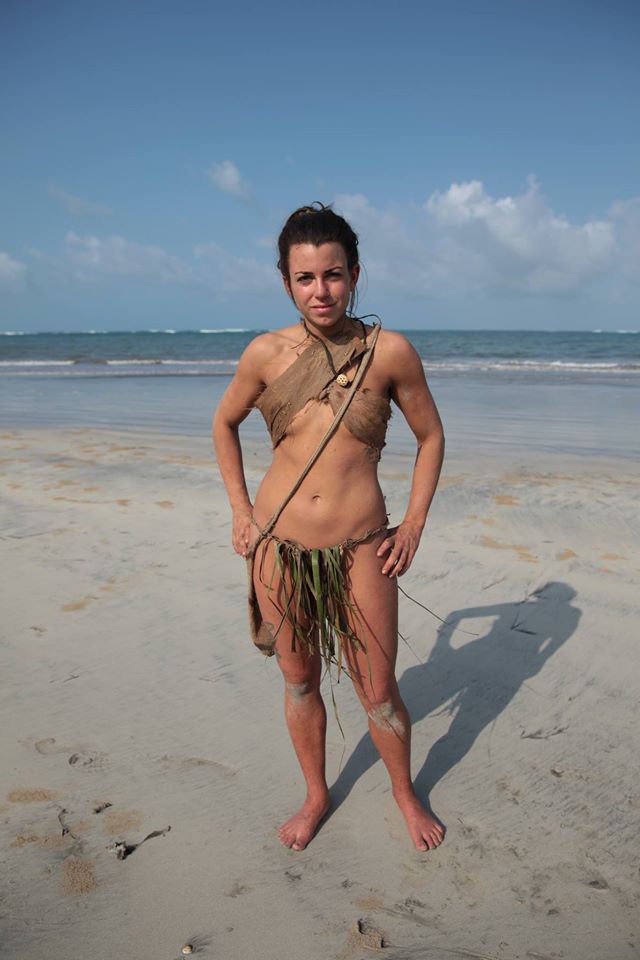
Most recently, Laura Zerra has raised attention in military circles, where she’s given talks on mental toughness. She reduces surviving in austere environments, in cities, or on The Price Is Right, down to a basic ability to fail. There are real skills to learn, in survival and life, be it how to start a fire or read a room, but she says, “The greatest thing I’ve learned is how to fail.”
“I can have stuff thrown at me all day where I’m like, ‘Oh no, this is really bad,’ and it’s gotten to the point in my life where I just think it’s hilarious. I think, This is so ridiculous. That psychology is really interesting. Some of it, I think, is innate to me, but I also feel like I’ve been training it. Look at people who have been in real survival situations. Some people go insane, with bugs for example, or the people who suffer massive injury, and crawl out 20 miles on two broken legs, or cut off their own arm, and they make it. Then others don’t have anything massive or traumatic happen, and they just give up. That’s interesting to me. You see it in remote situations with other people. It’s usually the people that are wildly confident, when the first thing goes wrong, that confidence shatters, and they give up.”
Laura Zerra does not give up.
In South Dakota, the sun is setting on our evening sit. We can’t see the river bottom anymore, but Laura Zerra doesn’t stop jigging. Deep below us are glimmers of another world. A gizzard shad with a small chunk bitten out of its back circles a few feet down. He’s been there all day, swimming in and out of our set — a damaged fish that we joke is our dark-house mascot.
“Part of being an adult,” she says, “is this realization you are not alone. It’s easier, as an adult, to find your tribe. All the stuff that made me a weird kid, a sad kid, to not have friends or fit in, those things people teach you to hide about yourself, now, that’s what people value most in me as an adult. I definitely felt like the black sheep. I felt like there’s no one else like me out there. I had a lot of evidence to support the fact that there was no one like me out there. Not a lot of kids were eating roadkill. But now, as an adult — and one of the cool things about social media — is it expanded this circle of total weirdos in my life, people not considered ‘normal,’ which is funny, because this all feels pretty normal to me.”
Read Next: Growing Up Heathen: A Look Into One Outlaw Motorcycle Club Family

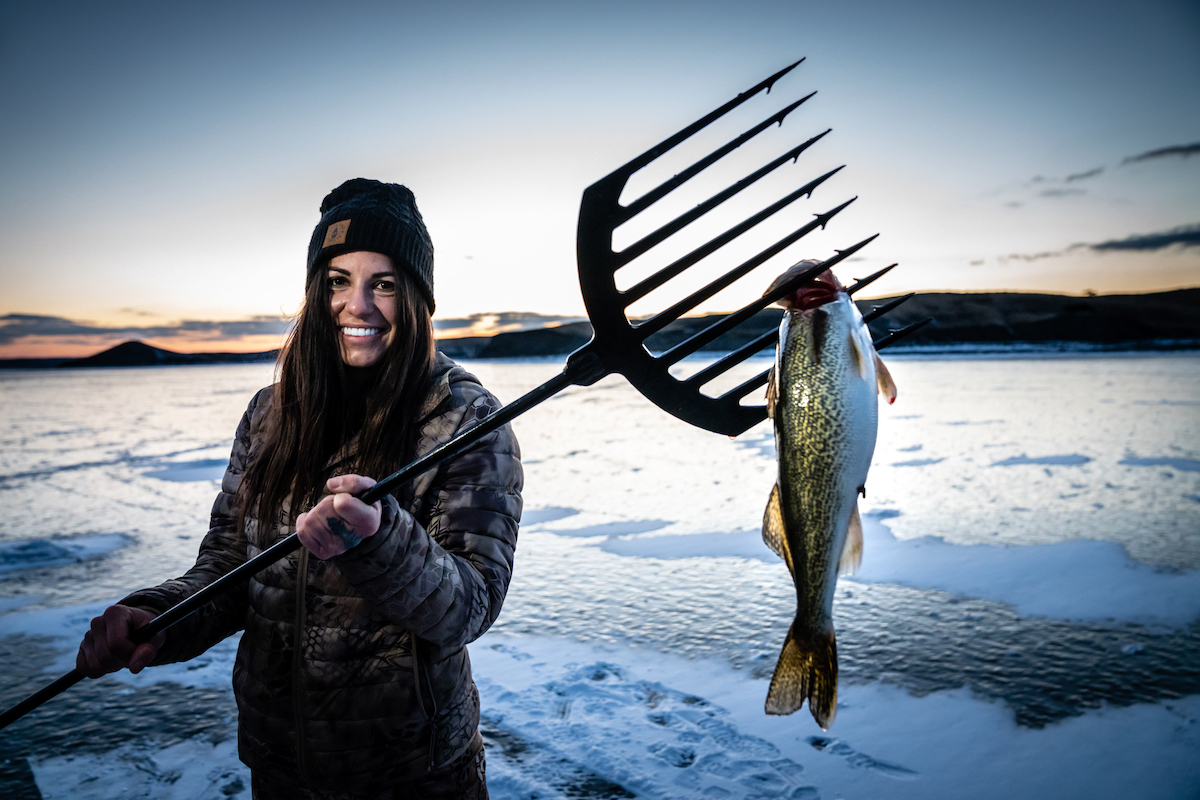
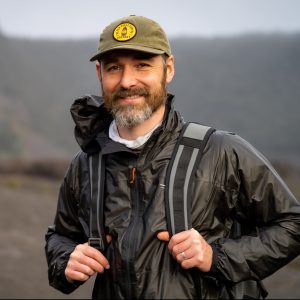
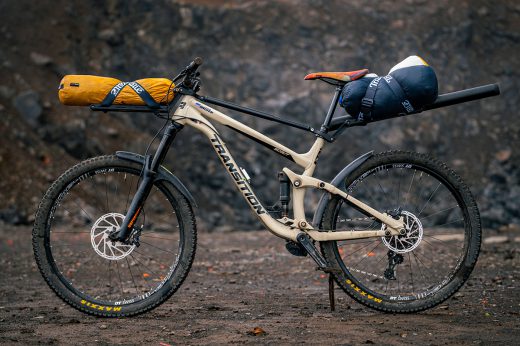
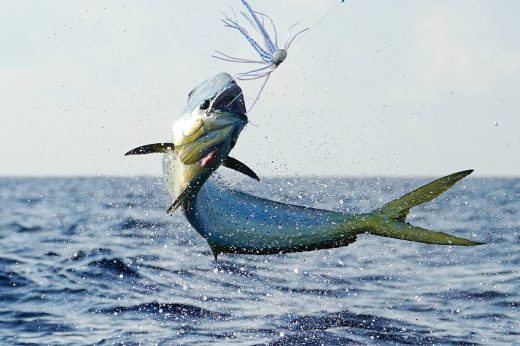
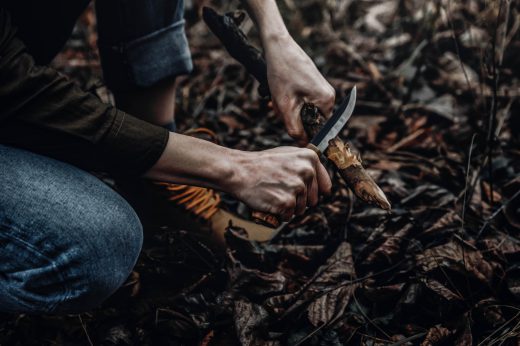


Ann Mundinger says
Trying to get ahold of Laura Zerra. Want to “pick her brain” and live life like I need to. Please help
Ann Mundinger
Michigan
Ann Mundinger says
Laura Zerra…watching naked and afraid.
Want live life and getting ready to make some adventure
Lyndon Johnson says
I would love to meet her someday but I believe I am too old to ever see her.